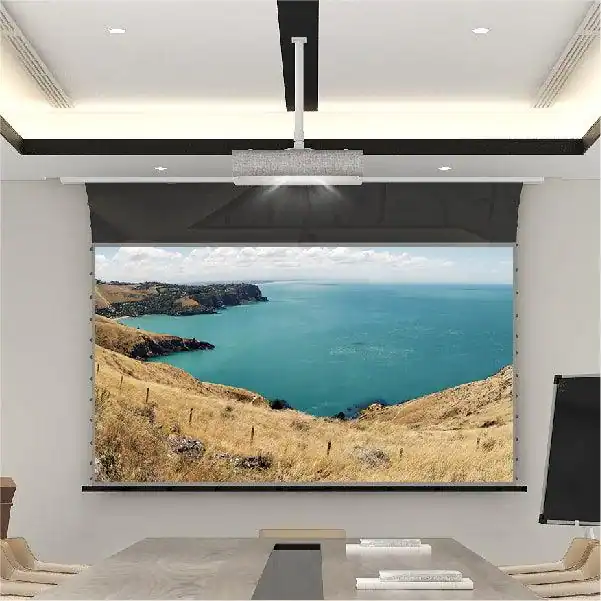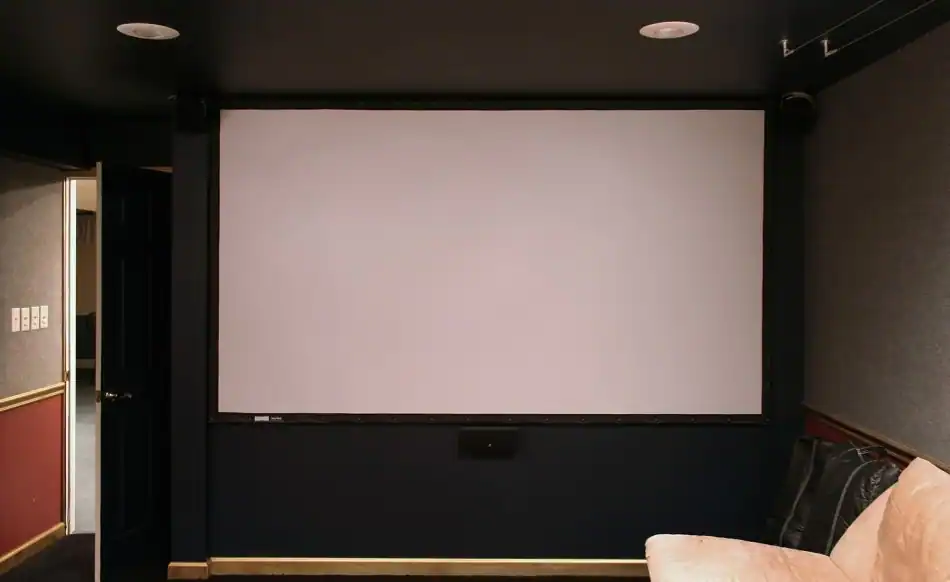Projector screens are an essential component of any home theater or presentation setup. They enhance the visual experience by providing a dedicated surface for projecting images and videos.
The color of the projector screen can significantly impact the quality of the projected image. Therefore, one of the debates among home theater enthusiasts is whether a black projector screen is better than a traditional white screen.
So here, in this article, we’ll explore the concept of black projector screens along with their benefits, and why & how they might be a better choice for your home theater setup.
Understanding Projector Screens
Before diving into the benefits of a black projector screen, let’s briefly understand the basics of projector screens. A projector screen is a flat surface that displays images and videos from a projector. It provides a dedicated canvas for projections, optimizing the viewing experience and ensuring high-quality visuals.

They come in various types, including fixed frame screens, motorized screens, and portable screens. The material used in the construction of the screen can impact its performance and image quality.
Types of Projector Screens
Projector screens come in various types, such as fixed-frame screens, motorized screens, and portable screens. Each type has its advantages, and users can choose based on their specific needs and preferences.
Advantages of Using a Projector Screen
Using a projector screen offers numerous advantages. They enhance image brightness, contrast, and clarity, creating a more immersive viewing experience compared to projecting onto a plain wall.
The Importance of Screen Color
Screen color is a crucial factor when it comes to projector screens. The color of the screen influences how light is reflected and absorbed, ultimately affecting the perceived image quality.
Traditional projector screens are usually white or off-white in color, which provides a neutral surface for projecting images. However, the rise in popularity of black projector screens has sparked a debate regarding their advantages over conventional white screens.
The Black Projector Screen: An Overview

What is a Black Projector Screen?
Unlike conventional white screens, a black projector screen features a dark surface that absorbs ambient light and prevents reflections. This results in improved image contrast and color saturation, elevating the overall viewing experience.
How Does It Work?
The secret behind a black projector screen lies in its ability to minimize light scatter. When light from the projector hits the screen, it is absorbed, rather than being reflected back to the audience or surrounding surfaces. As a result, the projected image appears sharper and more defined.
Why a Black Projector Screen Is a Game-Changer: Key Benefits

Black projector screens are becoming increasingly popular among home theater enthusiasts. They offer a unique and immersive viewing experience that is hard to match with traditional white screens. Below are some of the Key Benefits of using black Projector Screen.
- Enhanced Contrast: The dark surface of a black projector screen enhances contrast, making colors appear richer and more vibrant. It creates deep blacks and bright whites, ensuring an immersive visual experience.
- Improved Color Accuracy: By absorbing ambient light, black projector screens reduce color washout and maintain accurate color reproduction. This is especially beneficial when watching movies or playing games with intricate color details.
- Reduced Glare and Reflections: Black screens minimize glare and reflections caused by ambient light sources, allowing viewers to focus on the projected content without distractions.
Recommended:
- How To Clean A Projector Screen (Top Secrets Revealed!)
- Learn How To Hang A Projector Screen Like A Pro!
- Projector Screen vs. Wall – Which One Delivers the Perfect Viewing Experience?
- Projector In Basement: Turn Your Basement into a Home Theater Haven
- Best Cheap Projector For PowerPoint Presentations
- How To Enlarge Screen On A Projector? (Steps & Solutions)
How a Black Projector Screen Elevates the Home Theater Experience
When it comes to creating a remarkable home theater experience, the choice of a projector screen plays a crucial role. While traditional white projector screens have been the go-to option for many years, black projector screens are now gaining popularity for their ability to elevate the viewing experience.

So, explore the below points to know how a black projector screen can elevate your home theater experience and take it to new heights.
Contrast and Image Quality
The Importance of Contrast
Contrast is a crucial aspect of image quality. It refers to the difference between the darkest and brightest parts of an image. A high-contrast image provides better depth and detail, making the visuals more lifelike and engaging.
Impact on Image Quality
A black projector screen significantly improves contrast, resulting in sharper and more realistic images. The deep blacks produced by the screen enhance shadow details, making dark scenes more immersive. Additionally, brighter highlights stand out against the dark background, adding depth to the visuals.
Enhancing the Viewing Experience
With a black projector screen, viewers can enjoy movies, sports, and gaming with enhanced image quality. The heightened contrast and improved color accuracy contribute to a more cinematic experience, bringing the content to life and making it visually captivating.
Ambient Light Considerations
Dealing with Ambient Light
One of the challenges of projecting images is ambient light interference. In well-lit rooms or spaces with windows, ambient light can wash out the projected image, resulting in reduced visibility and diminished image quality.
Managing Glare and Reflections
Black projector screens excel at managing glare and reflections. The dark surface absorbs light and minimizes its scattering, allowing viewers to enjoy crisp images without distracting reflections. This makes black projector screens an excellent choice for rooms with moderate ambient light.
Is a Black Projector Screen Better?

Weighing the Pros and Cons
While black projector screens offer numerous benefits, it’s essential to consider the specific requirements of your setup. Here are some factors to consider:
- Room Environment: Black projector screens perform best in rooms with controlled ambient light. If your room is well-lit or has significant natural light, a black projector screen may not be the ideal choice.
- Desired Image Aesthetics: Black projector screens excel in creating high contrast and vibrant colors. If you prioritize image depth and accurate color reproduction, a black projector screen can enhance your viewing experience.
- Projector Compatibility: Ensure your projector is capable of producing sufficient brightness to compensate for the light absorption properties of a black projector screen.
Ideal Scenarios for a Black Projector Screen
Black projector screens are particularly well-suited for:
- Dedicated Home Theaters: Rooms specifically designed for home theater setups with controlled lighting conditions.
- Dimly Lit Rooms: Spaces where you have control over ambient light and can create a more cinematic environment.
- Gaming Enthusiasts: Gamers who want to experience vivid visuals and immersive gameplay.
DIY Black Projector Screen – Is It Worth It?
Materials and Steps for Making a DIY Black Screen
If you’re on a budget or enjoy DIY projects, creating your own black projector screen is an option worth exploring. To make a DIY black screen, you will need blackout cloth, a wooden frame, spray adhesive, and basic tools. Online tutorials and guides can provide detailed step-by-step instructions to help you create a custom screen.
Pros and Cons of DIY Screens
While a DIY black projector screen can be cost-effective, it’s essential to consider the trade-offs. DIY screens may not achieve the same level of quality as commercially available screens and the installation process might require additional effort. Additionally, DIY screens may lack warranty and technical support, which can be valuable when dealing with potential issues.
How to Choose the Right Black Projector Screen?
When selecting a black projector screen, several factors come into play which has given below:
Room Lighting Conditions
Consider the lighting conditions of the room where the projector will be used. If the room has controlled lighting or can be darkened easily, a white screen may suffice. However, if there is significant ambient light present, a black screen would be more suitable to combat light interference.
Viewing Distance
The viewing distance plays a crucial role in determining the size and type of projector screen. For shorter viewing distances, a smaller screen size would be appropriate, while larger screens are ideal for longer distances. Black screens can enhance the viewing experience by minimizing the impact of ambient light at various viewing distances.
Projector Type
Different projectors have varying brightness levels and contrast capabilities. Consider the specifications of the projector you will be using and choose a screen that complements its characteristics. Black projector screens can compensate for projectors with lower brightness levels by improving contrast and image quality.
How to Set Up a Black Projector Screen

Setting up a black projector screen requires careful positioning and consideration of room lighting. So below are a few key steps given to follow:
Positioning and Installation
Ensure that the screen is positioned at an appropriate height and angle for optimal viewing. You can follow the manufacturer’s instructions for installation and also seek professional assistance if required.
Room Lighting Considerations
In a dedicated home theater or dark room environment, controlling ambient light is relatively easier. However, if you plan to use a black projector screen in a well-lit room, consider using curtains or blinds to minimize external light sources that could affect the image quality.
How to Optimize a Black Projector Screen
To maximize the benefits of a black projector screen, certain optimization techniques should be employed.
Proper Placement and Calibration
Position the projector and screen in a way that minimizes ambient light interference. Optimal placement can enhance contrast and overall image quality. Additionally, calibrate the projector settings to match the screen characteristics, ensuring accurate color reproduction.
Ambient Light Control
Create a suitable viewing environment by controlling ambient light. Use curtains or blinds to darken the room and minimize external light sources. This will reduce distractions and improve the visual experience.
Screen Material Selection
Choose a high-quality screen material specifically designed for black projection. The material should be capable of absorbing light while maintaining image clarity and color accuracy. Consult with experts or refer to manufacturer recommendations for the best screen material options.
Is A Black Projector Screen Better: FAQs

Is a black projector screen suitable for all types of projectors?
Black projector screens are compatible with most types of projectors, including LCD, DLP, and LED models. However, it is essential to ensure that the projector’s brightness and contrast capabilities align with the screen’s characteristics for optimal performance.
Can I use a black projector screen in a well-lit room?
While black projector screens perform best in controlled lighting conditions, they can still be used in well-lit rooms. However, the overall image quality and contrast may be affected by excessive ambient light.
Are there any disadvantages to using a black projector screen?
Black projector screens have specific advantages, but they may not be suitable for every situation. In brightly lit environments, the image may appear darker, and the overall brightness may be reduced compared to a white screen.
Can I paint my existing projector screen black for the same effect?
While it’s possible to paint a screen black, it requires careful consideration of the right type of paint and surface preparation. Professional-grade black projector screens are designed to optimize image quality and are generally recommended for the best results.
Do black projector screens require special cleaning?
Black projector screens should be cleaned regularly to maintain optimal performance. Follow the manufacturer’s cleaning instructions and avoid using abrasive materials that could damage the screen’s surface.
Are DIY black projector screens as good as commercially available screens?
DIY black projector screens can be cost-effective, but they may not match the quality and performance of commercially available screens. Consider your priorities and the level of expertise required before opting for a DIY solution.
Final Thoughts
Projector Screens play a vital role in creating an immersive and captivating viewing experience. While traditional white Projector Screens have been the norm for many years, the emergence of Black Projector Screens has sparked a debate on whether they offer superior performance.
Black Projector Screens offer distinct advantages over traditional white screens. They enhance the contrast ratio, improve color reproduction, and minimize ambient light reflection.
By following optimization techniques and debunking common myths, you can create a captivating visual experience with a Black Projector Screen. Black Projector Screens may not be suitable for all scenarios, but they offer distinct advantages in specific environments. Thanks For Reading!
As an experienced Software Engineer in a Projection-Based Technology Company, I love sharing my Knowledge to utilize and help others to learn more about Projectors. Thus one can get the right Projector for their needs.




thx
its very knowledgeable…I gained much information from your article.